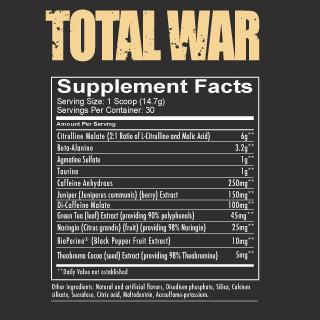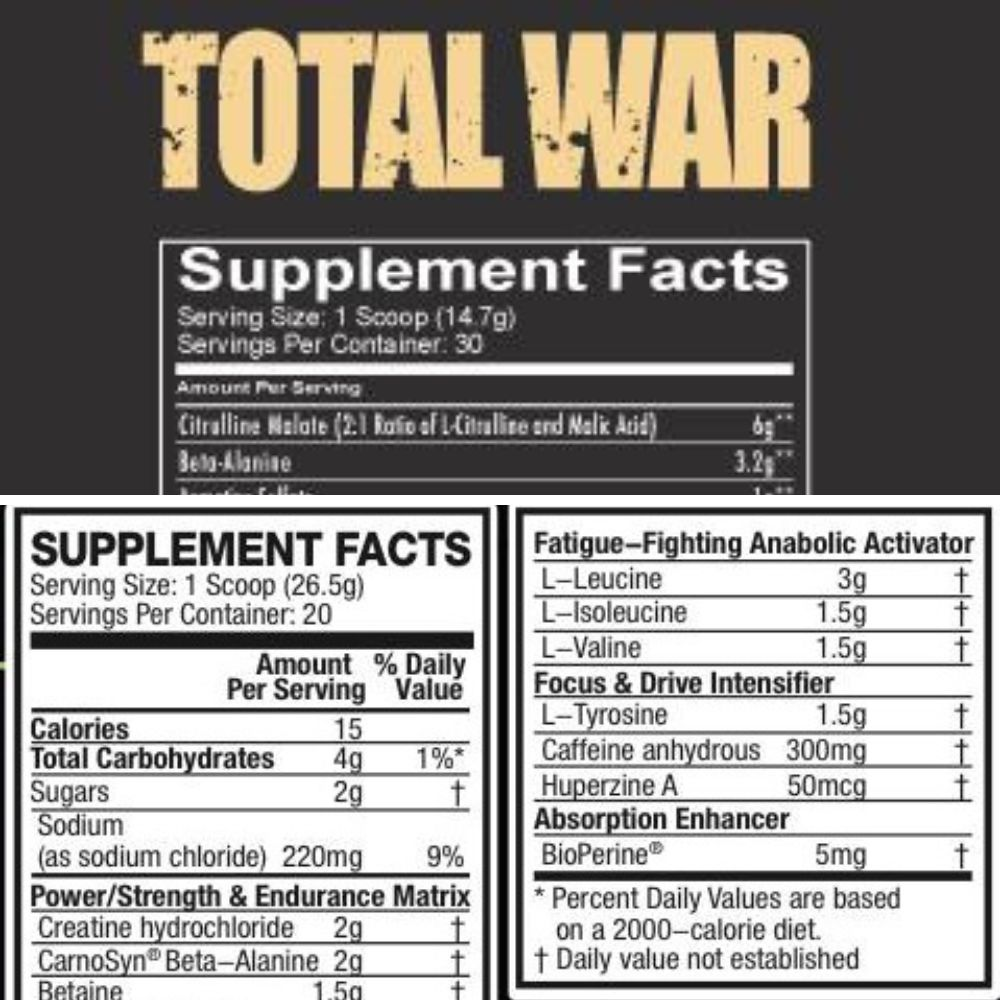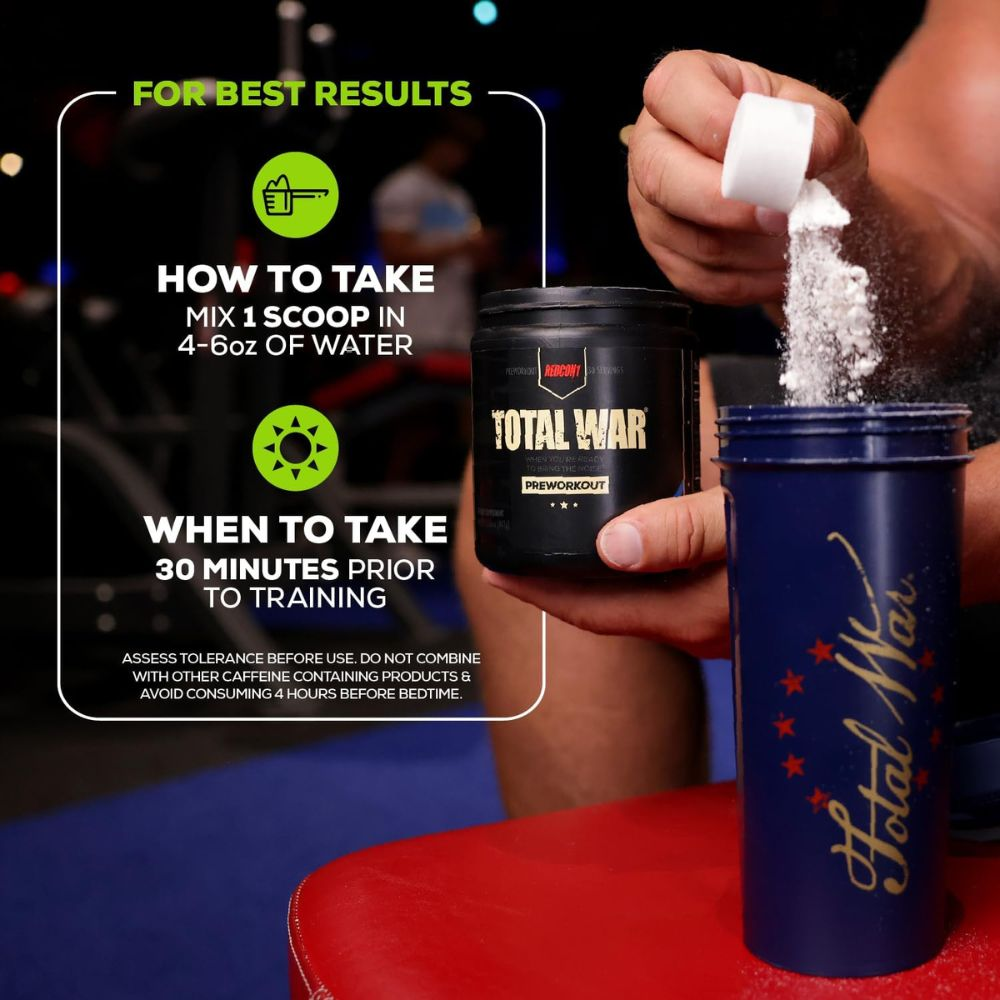Are you looking to enhance your workout performance with the help of a pre-workout supplement? Total War Pre-Workout might just be the perfect choice for you! In this blog post, we’ll explore “how much caffeine is in Total War Pre-Workout”, its role in boosting energy and focus during workouts, potential side effects of high caffeine intake, and more. Are you ready to dive into the world of “how much caffeine is in Total War Pre-Workout”? Let’s begin!
Key Takeaways
- Total War Pre-Workout contains varying levels of caffeine depending on the form chosen, and should be consumed with caution.
- Caffeine in pre-workouts helps boost energy levels and enhance performance when taken 30 minutes prior to exercise within a dosage range of 3 to 6 mg/kg body weight.
- High caffeine intake can lead to potential side effects such as jitters, anxiety, increased heart rate. It is advised that users assess their personal tolerance for safe consumption.
Caffeine Content in Total War Pre-Workout

Redcon1 has created Redcon1 Total War, also known as Total War Pre-Workout, to give athletes an extra boost of energy and performance during physical activities. It helps them achieve more in their training and push past their potential.
The caffeine content in this pre-workout supplement varies depending on the form you choose: powder or ready-to-drink. Both forms aim to provide an energy boost and enhance exercise performance, but their caffeine content differs slightly.
It’s valuable to comprehend the caffeine content in your pre-workout, as excessive caffeine consumption might lead to side effects such as jitters, anxiety, and accelerated heart rate.
Now, we’ll delve into the specific caffeine content of Total War Pre-Workout, considering both its powder and ready-to-drink forms.
Powder Form
Total War Pre-Workout powder contains a substantial 320mg of di caffeine malate per scoop, providing a significant energy boost for workouts. To put this into perspective, the caffeine content in regular coffee can vary depending on the type and serving size.
The prescribed dosage of Total War Pre-Workout powder is one scoop mixed with 4-6 ounces of water, taken 30 minutes prior to training. The caffeine in the powder form is derived from green tea, juniper, and beta-alanine.
While the effects of 320mg of caffeine on workout performance can vary, some research indicates that it may enhance endurance and time-trial performance in sustained maximal endurance exercise.
Ready-to-Drink Form
The ready-to-drink version of Total War Pre-Workout, also known as Total War energy drink, is a good pre workout drink that comes with slightly different caffeine content but still offers a substantial energy boost.
The precise caffeine content in this ready-to-drink version is 350mg per serving, which may help increase blood flow during workouts.
Comparing the caffeine content between the ready-to-drink and powder forms, the ready-to-drink version contains 365mg of caffeine, whereas the powder form contains 320mg of caffeine anhydrous.
Remember, consuming caffeine in a ready-to-drink version versus a powder likely won’t cause a significant difference in how it’s processed or absorbed.
Understanding Caffeine's Role in Pre-Workouts

Caffeine serves a vital function in pre-workout supplements, offering energy and enhancing focus during workouts. Its advantages stretch beyond physical performance, contributing to mental aspects as well, assisting you in maintaining focus and motivation throughout your training.
Here, we’ll investigate caffeine’s two main contributions to pre-workouts: the energy surge and the improvement of concentration. Gaining insight into how caffeine aids in these areas can assist you in optimizing its benefits while reducing potential drawbacks.
Energy Boost
Caffeine in pre-workouts helps increase energy levels, allowing for more intense and longer-lasting workouts. It achieves this by:
- Improving exercise performance, both anaerobic and aerobic
- Augmenting muscle contraction
- Reducing fatigue
- Stimulating the central nervous system, promoting alertness and concentration during workouts.
For an energy boost in workouts, it is advised that an individual consumes between 3 and 6 mg/kg of body weight of caffeine, taken 30-60 minutes prior to exercise. This dosage range allows caffeine to effectively enhance:
- Endurance
- Strength
- Power
- Mental alertness
This can help you enhance muscle pumps and push through even the toughest workouts.
Focus and Alertness
Besides boost energy, caffeine also improves focus and alertness, enabling better concentration and performance during exercise. The mechanism of action of caffeine in boosting focus and alertness during workouts is primarily through its antagonistic action on adenosine receptors in the central nervous system.
To enhance concentration during physical activity, it is advised that 3-6 mg/kg body mass of caffeine is taken. Starting with a lower dose (approximately 100-200 mg) and incrementally increasing it as necessary can help you find the perfect balance of caffeine intake for optimal focus and alertness during your workouts.
Potential Side Effects of High Caffeine Intake

Though caffeine offers various benefits, excessive consumption in pre-workouts could result in side effects like jitters, anxiety, and a quicker heart rate.
Recognizing these side effects and knowing how to prevent them ensures you reap the maximum benefits from your pre-workout supplement without risking your health or exercise performance.
In the next subsections, we’ll delve into possible side effects of high caffeine consumption, such as jitters, anxiety, and an elevated heart rate.
Being aware of these side effects allows you to make informed decisions regarding your caffeine intake and choice of pre-workout.
Jitters and Anxiety

Excessive caffeine consumption may cause jitters and anxiety, negatively impacting workout performance. Caffeine’s stimulatory effect on the central nervous system can lead to:
- feelings of nervousness
- anxiety
- impeded focus
- coordination during exercise
Caffeine-induced anxiety can have a detrimental effect on workout performance, as it can result in restlessness and decreased cognitive and physical performance. To avoid these negative effects, it is essential to find the correct balance of caffeine intake and assess your personal tolerance to caffeine (as discussed in Section 5).
Increased Heart Rate
High caffeine intake can also lead to an increased heart rate, posing potential health risks for some individuals. Caffeine stimulates the heart rate through the release of hormones such as noradrenaline and norepinephrine, which elevate heart rate and blood pressure.
Additionally, caffeine may impact nitric oxide production, further affecting cardiovascular health.
Potential health risks associated with a caffeine-induced increase in heart rate may include an increased risk of cardiovascular disease, elevated blood pressure, and potential arrhythmias.
However, the majority of studies do not indicate an increased risk of coronary heart disease or heart attack.
It is important to bear in mind that individual responses to caffeine may differ and that certain populations, such as those with pre-existing cardiac conditions, may be more susceptible to heart rate increases from caffeine than healthy adults.
Total War Pre-Workout vs. Other Pre-Workouts: Caffeine Comparison

Comparing the caffeine content of Total War Pre-Workout to other well-known pre-workout supplements helps highlight the disparities and resemblances, aiding you in making an informed decision on the pre-workout supplement that best aligns with your needs and caffeine tolerance.
Total War Pre-Workout contains 200mg of caffeine per serving, which is more than C4 Pre-Workout (150mg), Optimum Nutrition Gold Standard Pre-Workout (175mg), and MusclePharm Assault Pre-Workout (200mg), but less than BSN N.O.-Xplode Pre-Workout (275mg).
This comparison can help you choose a pre-workout supplement with a caffeine content that aligns with your preferences and personal tolerance.
Tips for Safe Caffeine Consumption in Pre-Workouts

For safe caffeine consumption in pre-workouts, evaluating personal tolerance and adhering to appropriate timing and dosage guidelines is necessary.
Such practices enable you to optimize the benefits of caffeine in your pre-workout supplement while curtailing the chances of potential side effects.
In this segment, we’ll provide advice on determining your personal caffeine tolerance (5.1) and adhering to correct timing and dosage guidelines (5.2).
Applying these suggestions will support safe caffeine consumption in pre-workouts, augment your workout performance, and safeguard your health.
Assessing Personal Tolerance
Assessing personal caffeine tolerance is crucial to avoid potential side effects and ensure optimal workout performance. Factors that can influence an individual’s ability to tolerate caffeine include:
- Genetics
- Gender
- Age
- Diet
- Medications
- Smoking
- Pregnancy
- Enzyme activity
Considering these factors will help you determine your own caffeine tolerance level.
To accurately assess your caffeine tolerance, pay attention to how your body responds after consuming caffeine and take note of any changes in energy levels, focus, or sleep patterns.
Decreasing caffeine intake or consuming it less often may also be beneficial to observe any differences in tolerance.
Additionally, keeping a daily log of caffeine consumption and other factors such as food, drink, and medication intake can help determine if more caffeine is being taken in than realized.
Timing and Dosage

Following proper timing and dosage guidelines for caffeine consumption in pre-workouts can help maximize benefits and minimize risks.
It is generally recommended to consume caffeine 60 minutes prior to exercising, to ensure its absorption into the system and its subsequent beneficial effects during the workout.
The suggested dosage of caffeine for pre-workouts is 3-6mg per kg of body weight. Starting with a lower dose (approximately 100-200 mg) and incrementally increasing it as necessary can help you find the perfect balance of caffeine intake for optimal focus and alertness during your workouts.
Alternatives to High-Caffeine Pre-Workouts
For those seeking alternatives to high-caffeine pre-workouts, there are several options available with lower caffeine content or alternative energy-boosting ingredients.
These alternatives can provide the energy and focus benefits without the potential side effects associated with high caffeine consumption.
When exploring alternatives, consider pre-workout supplements with lower caffeine content or those containing ingredients such as creatine, citrulline, or other natural energy boosters.
By opting for these alternatives, you can still enjoy the benefits of a pre-workout supplement without the risks associated with high caffeine intake.
Summary
In conclusion, Total War Pre-Workout offers a powerful energy boost and increased focus to help you maximize your workout performance. Understanding the caffeine content in both powder and ready-to-drink forms, its role in pre-workouts, potential side effects, and how to safely consume it is crucial for achieving the best results.
Whether you choose Total War Pre-Workout or another pre-workout supplement, always remember to assess your personal caffeine tolerance and follow proper timing and dosage guidelines to ensure a safe and effective workout experience.
Frequently Asked Questions
How much caffeine is in TOTAL WAR preworkout?
Every scoop of TOTAL WAR contains 325mg of caffeine, derived from 250mg Caffeine Anhydrous and 100mg Di-Caffeine Malate, plus another stimulant, AMPiberry. This makes Total War one of the most potent pre-workout supplements available on the market.
Does TOTAL WAR have too much caffeine?
Total War contains a total of 320 milligrams of caffeine, which may be too much for those with lower stimulant tolerances and could cause negative effects like jitters and nervousness.
What pre-workout has 300 mg of caffeine?
Cellucor C4 Ultimate Pre Workout Powder offers 300mg of caffeine per serving, making it an ideal pre-workout choice for those looking for an extra energy boost.
Can I take 2 scoops of TOTAL WAR pre-workout?
Based on the directions provided, it is not recommended to take more than 1 scoop of Total War pre-workout. Exceeding 2 scoops within a 24-hour period should be avoided.
What is the difference in caffeine content between the powder and ready-to-drink forms of Total War Pre-Workout?
The powder form of Total War Pre-Workout contains 320mg of caffeine per serving, while the ready-to-drink version contains 365mg, a 45mg difference.













